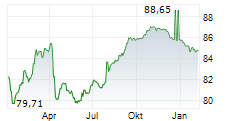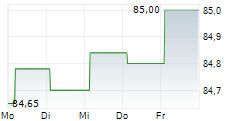NORTHAMPTON, MA / ACCESS Newswire / February 18, 2025 / For years, the relationship between sustainability and profitability in supply chain management was viewed as a zero-sum game. Businesses operated under the assumption that environmentally responsible practices were a necessary but costly obligation - a price to pay for regulatory compliance and reputational safeguarding. That narrative is rapidly evolving.
An industry study conducted by DP World and Supply Chain Dive's studioID polled 150 professionals in operations, supply chain, and procurement roles throughout various industries to reveal a decisive shift: 82% of respondents believe companies that prioritize supply chain sustainability experience improved financial performance over time. This data marks a critical inflection point, repositioning sustainability from a burdensome requirement to a strategic lever for financial growth, efficiency, and resilience.
These findings - and more - are captured in DP World's report, titled "Sustainability Drives Financial Benefit Across Supply Chains," available for download now.
The Strategic Rise of Sustainability
Sustainability is no longer a fringe concern. It has ascended the strategic priority ladder for corporations globally. According to the survey, 71% of respondents indicate their organizations have increased their focus on supply chain sustainability and decarbonization over the past three years, with 25% reporting a significant increase. This upward trajectory is set to continue, with 80% planning to increase their resource allocation towards sustainability initiatives over the next three years.
This evolution is not merely cosmetic. Companies are backing their rhetoric with resources: increased headcount, budgetary expansion, and organizational restructuring. Sarah Mouriño, Senior Director of Sustainability at DP World Americas, notes, "Sustainability has expanded to encompass diversity and inclusion, data security, and other elements that drive organizational resilience."
Financial Gains and Competitive Advantage
While consumer demand and regulatory pressures remain drivers, financial and operational benefits are increasingly steering sustainability investments. Efficiency gains and cost reductions ranked as primary motivations, with 36% of respondents citing these factors as key drivers. Additionally, 30% view sustainability as a means to enhance supply chain resilience-a critical attribute in an era punctuated by disruptions. Nearly one-third (32%) see sustainability as a critical competitive advantage, emphasizing the strategic edge it can provide.
Morten Johansen, Chief Operating Officer of DP World Americas, emphasized this point: "As we observe the transformative shift in supply chain practices, it's evident that sustainability is not just a trend but a foundational element for modern business strategies. This report highlights how integrating sustainability measures can serve as a catalyst for substantial improvements in both economic efficiency and strategic innovation."
Bronwyn Pountney, Environment Manager for DP World Canada, highlighted the tangible incentives driving this shift. "The Port of Vancouver's EcoAction Program offers shipping lines up to a 75% discount on harbor dues for utilizing shore power," she explains. Such programs exemplify the growing synergy between environmental responsibility and cost efficiency.
Value Propositions Driving Adoption
Organizations are increasingly evaluating sustainability through a business-first lens. When assessing the adoption of supply chain sustainability initiatives, the survey identifies compliance with regulatory requirements and risk reduction as top priorities. However, cost savings through efficiency improvements-such as reduced waste, faster processes, and optimized energy consumption-resonate deeply with supply chain managers traditionally measured by cost and performance metrics.
Mouriño underscores this alignment: "Reducing emissions often results from improving operational efficiency. Once companies recognize these parallel benefits, the business case for sustainability becomes undeniable."
Climate Concerns and Cost Pressures
Despite this momentum, concerns linger. Cost remains the most significant barrier to scaling sustainability efforts, with 65% of respondents citing it as their primary challenge. Regulatory uncertainty and operational complexity further compound hesitancy. Nonetheless, the trajectory is clear-supply chain leaders are moving forward, driven by a blend of necessity and opportunity.
Scope 3 Emissions: The Next Frontier
Perhaps the most significant development on the horizon is the focus on Scope 3 emissions-indirect emissions from suppliers and partners. While the U.S. Securities and Exchange Commission (SEC) recently paused mandatory Scope 3 reporting, other jurisdictions like California and the European Union are advancing such requirements. Forward-looking companies are not waiting.
According to the survey, leading strategies to reduce Scope 3 emissions include:
Reconfiguring supply chains through nearshoring and reshoring (25%)
Collaborating with industry peers on decarbonization initiatives (25%)
Reducing or replacing third-party emissions sources (23%)
These moves signify a broader transition from passive reporting to proactive transformation as companies prepare to adapt to anticipated regulations, regardless of the current SEC position.
Carbon Accounting as a Business Imperative
As organizations pursue emission reductions, carbon accounting has emerged as a foundational capability. The survey reveals that 35% of respondents are enhancing collaboration between accounting and supply chain departments to improve carbon data accuracy. Investment in emission-tracking systems and the setting of reduction targets are also gaining traction.
Transportation - a major emission source - is under particular scrutiny. Companies are adopting multimodal solutions, shifting from air to sea freight, and exploring alternative fuels. Apple's transition from air to ocean freight, cutting emissions by 95%, is a widely cited benchmark. UPS, similarly, has made strides toward using 40% alternative fuel by 2025.
Partnerships: A Sustainability Multiplier
Collaboration is proving indispensable. Supplier sustainability credentials are now pivotal in partnership evaluations, with 46% of respondents stating that a partner's decarbonization capabilities significantly influence supplier selection.
Pountney points to DP World's initiatives in Vancouver, where low-carbon fuels and electrified port equipment are transforming container operations. "When partners see us reducing our Scope 1 and 2 emissions, they realize we can help reduce their Scope 3 footprint," she says. "It's a win-win."
Suppliers are increasingly viewed as sustainability enablers. Key expectations include:
Reducing transportation emissions (37%)
Developing energy-efficient products and materials (35%)
Implementing carbon reduction measures within their operations (31%)
The Road Ahead
The DP World survey findings signal a paradigm shift. Sustainability is no longer a corporate social responsibility checkbox. It is an engine for growth, efficiency, and resilience. Companies that integrate sustainability into their supply chain DNA will be best positioned to navigate the complexities of a rapidly evolving global economy.
As Mouriño aptly concludes, "The business benefits are becoming more widely acknowledged. This evolution will only accelerate."
The future of supply chains is green - and increasingly, it is also profitable.
Download "Sustainability Drives Financial Benefit Across Supply Chains" today.
Survey Methodology
DP World collaborated with Supply Chain Dive to conduct an online survey, polling 150 respondents in operations, supply chain, and procurement roles across various industries. The respondents represented a diverse range of sectors, including industrial manufacturing (39%), healthcare/hospitals (20%), consumer products manufacturing (9%), and technology (9%). The largest segment of respondents came from organizations with annual revenues between $101M-$500M (19%), followed by $51M-$100M (16%), and $1.1B-$10B (15%). The survey respondents were based in the United States and Canada.
###
View additional multimedia and more ESG storytelling from DP World on 3blmedia.com.
Contact Info:
Spokesperson: DP World
Website: https://www.3blmedia.com/profiles/dp-world
Email: info@3blmedia.com
SOURCE: DP World


